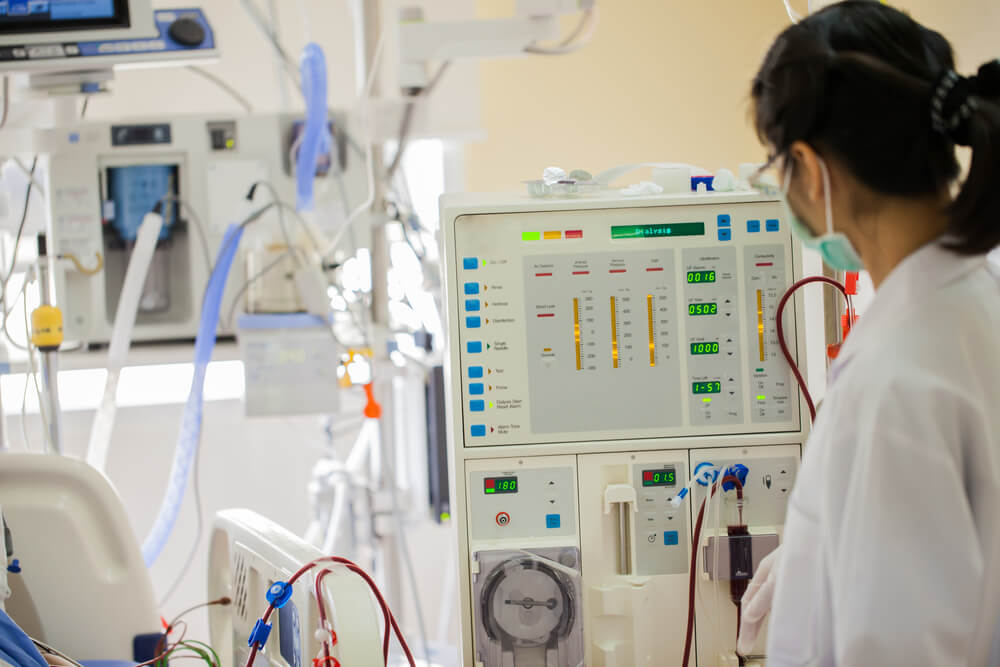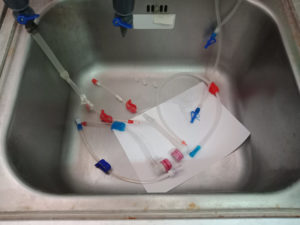
27 Oct The Importance of Infection Prevention and Control in Dialysis Settings
Dialysis is a life-saving treatment for patients of all ages with end-stage kidney diseases. Infection prevention and control in an artificial kidney unit or a dialysis setting, as well as hemodialysis provided in homes, is essential to protecting the health of these vulnerable patients.
Hemodialysis is a life-saving treatment, but dialysis carries the risk of infection (including bloodstream infection) that could be life-threatening, which requires strict adherence to infection prevention, including hand hygiene.
Prevalence of Dialysis in the U.S.
There are more than 700,000 dialysis patients with end-stage kidney disease in the United States, and the need for dialysis is increasing by 20,000 patients per year. While the best treatment for patients with end-stage kidney disease is a kidney transplant, the shortage of donated organs means that most patients with the condition rely on dialysis. This, in turn, emphasizes the importance of infection prevention.
Why Infection Prevention and Control is Vital for Dialysis Patients
Since hemodialysis does the work of the kidneys by cleansing a patient’s blood, a lack of infection prevention and control could result in a life-threatening infection. Infection is a leading cause of hospitalization and the second-leading cause of death for dialysis patients. Life-threatening infections that could occur through dialysis include:
Respiratory Viruses
During dialysis, patients could spread respiratory viruses among each other and health care workers without the proper infection prevention processes in place. Diseases such as COVID-19 and influenza can spread in a dialysis clinic.
You can reduce the risk of this spread with proper hand hygiene, including the use of alcohol-based hand sanitizer, personal protective equipment such as face masks, and educating patients to practice respiratory hygiene such as coughing or sneezing into the inside of the elbow to avoid droplet spray or using a tissue, disposing of the tissue immediately after use, and cleaning hands after coughing or sneezing.
Dialysis facilities should provide tissues and hand sanitizers for patients and visitors to comply with respiratory hygiene. Patients with upper respiratory symptoms should be provided a mask, if tolerated. If dialysis can’t be postponed, consider scheduling a patient with upper respiratory symptoms later in the day, when possible.
Bloodborne Infections
Contact transmission of bloodborne pathogens such as hepatitis B and hepatitis C is also dangerous for dialysis patients and reinforces the need for infection prevention.
Hepatitis B, which can survive on surfaces outside the body longer than other viruses, such as hepatitis C, is a greater danger to dialysis patients.
Dialysis with a central venous catheter has a greater risk of bloodstream infection than when using an arteriovenous fistula. Using chlorhexidine gluconate to prevent sepsis and disinfecting catheter hubs before use can reduce the risk of infection, as can keeping the exit site clean and dry.
Water purity in dialysis is essential to keeping patients infection-free. To this point, the Center for Medicare and Medicaid Services (CMS) standards contain specific requirements for critical water and dialysate.
Drug-Resistant Infections
Dialysis patients who take antibiotics for bloodstream infections are more at risk for an antibiotic-resistant infection. Overuse of antibiotics can also result in a greater risk of Clostridioides difficile, or C-diff, infections, which can be fatal. Each year, about a third of dialysis patients are given intravenous antibiotics for infections, putting them at higher risk for antibiotic resistance.
Infection Control Measures
Patients and medical professionals all play roles in reducing the risk of infection through dialysis. Taking these steps will keep dialysis safer:
- Clean the fistula site with soap and water before each dialysis treatment
- Practice hand hygiene by washing hands or using hand sanitizer before and after dialysis
- Patients and health care workers should wear masks while hooking up their catheters to prevent infection
- Get the flu vaccine annually
- Get vaccinated against hepatitis B
- Be tested for hepatitis C routinely
- Use syringes and needles one time only
- Disinfect chairs after each patient’s use
One of the most effective ways to prevent and control infection is with infection control continuing education. Dialysis facilities can significantly reduce the risk of infection when all employees receive proper protocol training.
The Danger of Infection Is Rising
Hospital-acquired infections are increasing, with more than 722,000 occurring each year, including bloodstream infection. More than 75,000 patients die annually from infections acquired during a hospital stay or a procedure such as dialysis.
The COVID-19 pandemic heightened the risk of infection for dialysis patients. Creating effective protocols to fight new pathogens and following the most up-to-date healthcare guidelines will help keep everyone safe and healthy.
Infection prevention measures such as hand hygiene and environmental cleaning and disinfection can lower the risk, but these measures should be written into policy. The first essential step that your healthcare organization can take to reduce the risk of infection through hemodialysis is contacting Infection Control Results.
Some methods to significantly reduce the risk of infection among hemodialysis patients include:
- Regularly inspecting equipment and addressing any concerns immediately
- Continuous and up-to-date training for all staff members and volunteers
- Streamlining and standardizing all patient practices
- Routine studies on effective and preventative procedures and documentation in the industry
- Working with a professional medical consulting team to build new effective strategies and techniques
- Continuous monitoring of existing procedures and their effectiveness
What to Expect When Working With Infection Control Specialists
As a dialysis provider, you want to see the positive results of your infection control measures. When you consult with a professional infection control specialist, you can ensure your organization is doing everything possible to protect your dialysis patients from life-threatening infections.
These industry experts will learn more about your dialysis center, policies, and procedures. An infection prevention consulting firm can pinpoint ways to prevent infection among the vulnerable population of dialysis patients.
These professionals will be with your healthcare organization every step of the way to answer questions and make recommendations in real time, as they arise. As a result, you’ll see reduced infection rates of dialysis patients following the infection prevention measures recommendations.
Some strategies an infection control specialist will use while working with your facility are:
- Risk assessments and evaluations
- Staff education and training
- Environmental infection control policies
- Employee health measures
- PPE regulations and recommendations
- Routine infection prevention training
- Procedures involving patients with blood-borne infections
- Annual process planning and evaluation
- Regulated and non-regulated waste handling and disposal protocols
- Maintaining dialysis water quality
- Blood-borne infection handling
- Catheter and vascular access care
- Handling microbiologic/endotoxin testing results
How ICR Can Help You Today
To learn how Infection Control Results can reduce infection risks in your healthcare facility, contact our team. Infection Control Results experts can provide a consultation and the necessary recommendations your organization can trust for effective infection prevention results within your dialysis setting to keep your staff and clients safe. Contact us today to speak with one of our talented team members.
